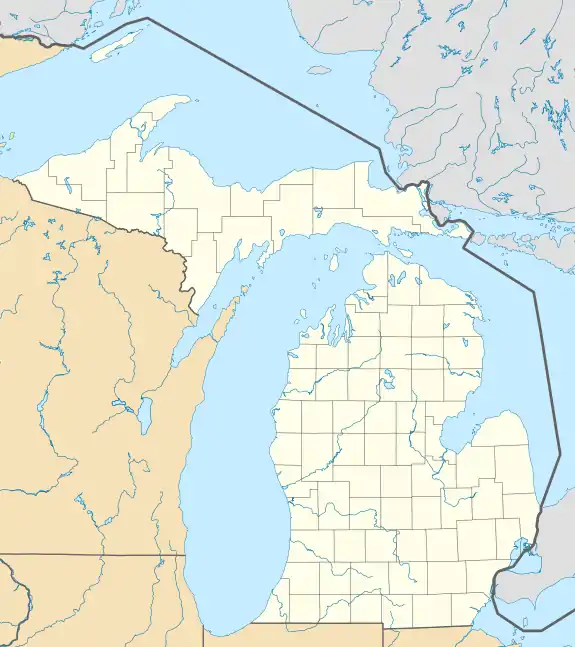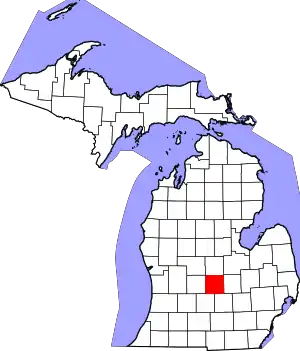Bath Charter Township, Michigan
Bath Charter Township is a charter township of Clinton County in the U.S. state of Michigan. As of the 2010 census, the township population was 11,598, which is a large increase from 7,541 at the 2000 census. It is situated directly north of the city of East Lansing.
Bath Township, Michigan | |
|---|---|
| Bath Charter Township | |
 Location within Clinton County (red) and the administered CDP of Bath (pink) | |
 Bath Township Location within the state of Michigan  Bath Township Location within the United States | |
| Coordinates: 42°48′21″N 84°25′06″W | |
| Country | United States |
| State | Michigan |
| County | Clinton |
| Established | 1826 |
| Government | |
| • Supervisor | Marie Howe |
| • Clerk | Kathleen McQueen |
| Area | |
| • Total | 35.03 sq mi (90.73 km2) |
| • Land | 31.83 sq mi (83.44 km2) |
| • Water | 3.20 sq mi (8.29 km2) |
| Elevation | 856 ft (261 m) |
| Population (2010) | |
| • Total | 11,598 |
| • Density | 364.4/sq mi (140.7/km2) |
| Time zone | UTC-5 (EST) |
| • Summer (DST) | UTC-4 (EDT) |
| ZIP code(s) | |
| Area code(s) | 517 |
| FIPS code | 26-05900[1] |
| GNIS feature ID | 1625889[2] |
| Website | Official website |
Communities
- Bath is an unincorporated community and census-designated place located within the western portion of the township.
History
Bath Township was originally organized in 1839 as Ossowa Township, having been split from DeWitt Township by an act of the governor. It was renamed Bath Township in 1843 after Bath, New York.
Park Lake at the southern edge of the township was the source of the Park Lake Trail, an important Native American trailway that intersected the Okemah Trail in what later became the city of East Lansing, Michigan. Park Lake developed into a regional recreation destination for the growing Lansing population after the state capitol relocated to Lansing in 1847 and the Michigan Agricultural College was established in East Lansing, Michigan in 1855. By the early 1900s Park Lake was surrounded by summer camps affiliated with various churches and associations as well as seasonal cabins and lodges. The most ambitious of these was the Park Lake Resort which featured a large dance pavilion built over the water on pilings. The Park Lake Dance Pavilion served as an entertainment venue playing host to many famous acts such as Tommy Dorsey until it burned in the 1930s. Years of decline followed and Park Lake never regained its former popularity.
Bath Township was the scene of the Bath School bombing, which is the deadliest act of mass murder in a school in United States history. It claimed more than three times as many victims as the Columbine High School massacre and twice as many victims as the Virginia Tech and the Sandy Hook Elementary School shootings.
Geography
According to the United States Census Bureau, the township has a total area of 35.03 square miles (90.73 km2), of which 31.83 square miles (82.44 km2) is land and 3.20 square miles (8.29 km2) (9.14%) is water.[3]
Demographics
| Historical population | |||
|---|---|---|---|
| Census | Pop. | %± | |
| 1960 | 3,732 | — | |
| 1970 | 4,832 | 29.5% | |
| 1980 | 5,746 | 18.9% | |
| 1990 | 6,387 | 11.2% | |
| 2000 | 7,541 | 18.1% | |
| 2010 | 11,598 | 53.8% | |
| U.S. Decennial Census | |||
2010 census
At the 2010 census there were 11,598 people in 4,697 households, including 2,596 families, in the township. The population density was 364.3 per square mile (140.6/km2). There were 5,106 housing units at an average density of 160.4 per square mile (61.9/km2). The racial makeup of the township was 87.5% White, 5.2% African American, 0.4% Native American, 3.6% Asian, 0.0% Pacific Islander, 1.0% from other races, and 2.3% from two or more races. Hispanic or Latino of any race were 3.4%.[1]
2000 census
Of the 2,799 households 37.1% had children under the age of 18 living with them, 60.6% were married couples living together, 9.8% had a female householder with no husband present, and 25.8% were non-families. 19.5% of households were one person and 4.4% were one person aged 65 or older. The average household size was 2.68 and the average family size was 3.10.
The age distribution was 28.2% under the age of 18, 6.8% from 18 to 24, 32.1% from 25 to 44, 25.0% from 45 to 64, and 7.9% 65 or older. The median age was 36 years. For every 100 females, there were 98.4 males. For every 100 females age 18 and over, there were 98.2 males.
The median household income was $53,881 and the median family income was $58,825. Males had a median income of $43,548 versus $31,056 for females. The per capita income for the township was $24,675. About 3.8% of families and 4.5% of the population were below the poverty line, including 3.8% of those under age 18 and 7.8% of those age 65 or over.
Education
School districts serving township residents:[4]
- Bath Community Schools
- East Lansing Public Schools
- Haslett Public Schools
- Laingsburg Community Schools
References
- "U.S. Census website". United States Census Bureau. Retrieved 2008-01-31.
- U.S. Geological Survey Geographic Names Information System: Bath Charter Township, Michigan
- "Michigan: 2010 Population and Housing Unit Counts 2010 Census of Population and Housing" (PDF). 2010 United States Census. United States Census Bureau. September 2012. p. 19 Michigan. Retrieved January 19, 2021.
- "School Districts." Bath Charter Township. Retrieved on December 8, 2016.
